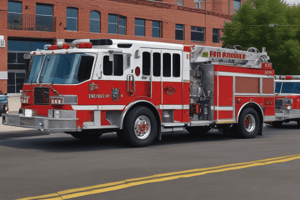Podcast
Questions and Answers
Under what conditions can a step-parent authorize consent for treatment and transport of a minor?
Under what conditions can a step-parent authorize consent for treatment and transport of a minor?
- If they are the minor's friend
- If they are the minor's neighbor
- If they are a legal guardian of the minor (correct)
- If they are the minor's teacher
Who can consent for and refuse treatment and transport according to the text?
Who can consent for and refuse treatment and transport according to the text?
- Grandparents of the minor
- Minors aged 14-17 years old (correct)
- Children under 10 years old
- Adult siblings of the minor
What is one of the conditions under which a minor can consent for and refuse treatment and transport?
What is one of the conditions under which a minor can consent for and refuse treatment and transport?
- If they own a car
- If they are allergic to peanuts
- If they are unemployed
- If they are pregnant (correct)
In which age range can minors refuse treatment and transport?
In which age range can minors refuse treatment and transport?
What is NOT a condition under which a minor can consent for and refuse treatment and transport?
What is NOT a condition under which a minor can consent for and refuse treatment and transport?
Can a minor aged 13 refuse treatment and transport according to the text?
Can a minor aged 13 refuse treatment and transport according to the text?
Under what circumstances can a step-parent not authorize consent for treatment and transport of a minor?
Under what circumstances can a step-parent not authorize consent for treatment and transport of a minor?
What is one of the required conditions for a minor to refuse treatment and transport?
What is one of the required conditions for a minor to refuse treatment and transport?
Can a step-parent authorize consent for treatment and transport of a minor if they are not the legal guardian?
Can a step-parent authorize consent for treatment and transport of a minor if they are not the legal guardian?
What is one of the conditions that allow minors to seek STD treatment or alcohol/drug addiction treatment?
What is one of the conditions that allow minors to seek STD treatment or alcohol/drug addiction treatment?
Flashcards are hidden until you start studying
Study Notes
Communication Modes
- There are two types of communication modes: Written and Verbal
- Verbal consists of three modes: Verbal, Radio, and Cellphone
Verbal Communication
- Used on the scene of an EMS incident while communicating with the patient, transferring care to another crew/provider or when transferring care to hospital staff in the emergency room
- Used while enroute to an EMS incident with the Romeoville Dispatch Center, mutual-aid agencies, Romeoville Fire Department (RFD) staff and to receiving hospitals as the need for back-up communications is identified (MERCI)
- Used for communications ranging from patient care reporting to a medical control location, contacting responsible parties involved in the medical refusal process, transmitting cardiac data and communicating with RFD staff
Written Communication
- Serves several important functions, including providing a written and legal record of the incident, conveying important clinical information from the field to the Emergency Room, and becoming part of the patient's medical records
- Can be utilized for billing, audits, quality improvement studies, research, legal defense, and ePCRs
Written Report
- All patient care reports (ePCRs) shall be completed and sent to the Will County server prior to departure from any receiving hospital unless there are extenuating circumstances (MCI) (IDPH Administrative Rule Title 77 Part 515.350)
- All ePCRs for refusals or lift assists shall be completed and sent to the Will County server prior to the end of any shift (am/pm)
EMS Reports
- Documentation Outline for EMS Reports includes:
- Chief Complaint
- History
- Patient complaint
- Symptoms
- Degree of Distress and/or Pain
- SAMPLE information as appropriate
- Assessment
- Vital Signs
- Trauma Score (if applicable)
- FAST Score (Stroke Care)
- Blood Sugar
- Pulse Oximeter
- 3-Lead EKG interpretation (if applicable)
- 12-Lead EKG interpretation (if applicable)
- Treatment
- Hospital Contact
- Mode of communication (E-bridge Alert, Radio, MERCI)
- Hospital transported to
Refusals
- Refusals shall be completed at the scene where the refusal is obtained
- Include the patient's signature and medical control approval if applicable
- If the patient is exhibiting violent tendencies, the officer shall be present in the patient-care area of the ambulance during the transport
- If a patient is unable to sign due to lack of competency or if handcuffed, and the patient is transported, the RN may sign the pcr
- If the patient refuses to sign the pcr and won't be transported, the police officer may only witness the word “Refused” documented on the pcr
Special Consent Situations
- Step-Parent Consent for Treatment and Transport
- Step-Parent may authorize consent for treatment and transport of a minor only if the step-parent is a legal guardian of the minor, has adopted the minor or authorized in some type of written document to obtain medical care for the minor in the absence of the parent of the legal guardian
- Minor Consent for Treatment and Transport
- A minor may consent for and refuse treatment and transport if:
- 14-17 years of age (EHEMSS Refusal Policy)
- If they are a parent
- If they are married
- If they are pregnant
- If they have been legally emancipated through appropriate court proceedings (patient also has documentation)
- Minors 12 and up seeking STD treatment or alcohol/drug addiction treatment
- A minor may consent for and refuse treatment and transport if:
Studying That Suits You
Use AI to generate personalized quizzes and flashcards to suit your learning preferences.




